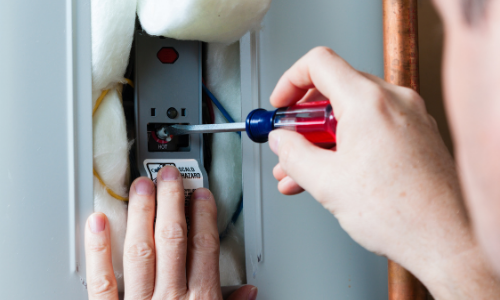We've unearthed this post relating to Is Your Water Heater Leaking? down the page on the net and thought it made perfect sense to share it with you here.

A water heater is among one of the most crucial fundamental home appliances that can be found in a home. With water heaters, you do not require to go through the stress and anxiety of heating water by hand whenever there is a need to wash, wash, or the dishes. There is always an opportunity that your water heating unit would act up as with most mechanical tools.
It is important to note any little breakdown as well as tackle it rapidly before points get out of hand. Most times, your hot water heater begins to malfunction when there is a build-up of sediments as a result of constant usage. As a precaution, routine flushing of your hot water heater is recommended to avoid sediment buildup and stop functional failure.
Usual hot water heater emergencies and exactly how to manage them
Leaking water heater tank.
A dripping tank could be a sign of rust. It might cause damage to the floor, wall surface and also electrical devices around it. You could also go to danger of having your house flooded. In this scenario, you ought to switch off your water heater, enable it to cool down, and also meticulously search for the source of the issue. At times, all you need to do is to tighten a couple of screws or pipe links in cases of minor leaks. If this does not function as well as the leak persists, you may need to employ the solutions of a technician for a suitable substitute.
Varying water temperature level.
Your water heating system can start generating water of various temperature levels usually ice hot or chilly hot. There may be a demand to change either the thermostat or the home heating unit of your water heating system.
Too little hot water
It may be that the water heating unit can't support the hot water need for your house. You can upgrade your water heating system to one with a larger ability.
Stained or smelly water
When this takes place, you need to know if the concern is from the storage tank or the water source. If there is no amusing smell when you run cold water, then you are specific that it is your water heating unit that is defective. The stinky water can be caused by rust or the accumulation of bacteria or debris in the water heating system container.
Verdict
Some property owners ignore little caution and minor faults in their hot water heater unit. This just brings about additional damage and a feasible complete failure of your device. You must manage your water heater faults as soon as they come near stay clear of more costs and also unnecessary emergency problems.
With water heaters, you do not require to go with the anxiety of home heating water by hand every time there is a demand to take a bath, do the laundry, or the meals. Your water heating unit could start generating water of different temperatures usually ice cold or scalding hot. It may be that the water heater can't sustain the hot water need for your apartment. If there is no amusing odor when you run chilly water, after that you are particular that it is your water heating system that is defective. The smelly water can be triggered by rust or the accumulation of bacteria or debris in the water heating unit tank.
Common Water Heater Issues and What You Should Do
What Type of Water Heater Do You Have?
Before we begin it’s first important that you identify the type of water heater you have on your property. There are two main types of water heaters out there: conventional and high efficiency.
Both of these types of products typically use either gas or electricity to heat power. There are also solar water heaters that use a thermal collector on the roof or yard to heat the water.
While these models are not as common, they can cut heating costs in half. In this article, we will focus on conventional and high efficiency.
How Do My Electric and Gas Water Heater Work?
Though they look similar, electric and gas water heaters work very differently. It’s important to know their basic function because often problems can be specific to the heating source.
In the electric model, a thermostat on the side of the machine detects the temperature of the water in the tank. When the temperature needs to rise electricity flows to a heating element suspended in the water.
Gas models also use a thermostat device — typically with a mercury sensor at the tip and an additional sensor called a thermocouple. The thermocouple detects whether the pilot light is on and controls the flow of gas.
When the thermostat drops below the appropriate level gas is released which becomes ignited by the pilot light. The flame heats the bottom of the water tank which causes hot water to rise and cold water to drop.
This natural circulation continues until the water reaches the desired temperature. Then, the thermostat triggers the gas control valve to shut off the flow of gas.
What Are the Most Common Issues and How Do You Fix Them?
https://happyhiller.com/blog/common-water-heater-issues-and-what-you-should-do/

We were shown that article about Warning Signs You Need Water Heater Repairs from a friend on another web property. Kindly take the time to promote this content if you liked it. Thanks a lot for your time. Kindly stop by our site back soon.
Preserve your space; contact us.
Comments on “Dealing with the Top Water Heater Crisis Situations”